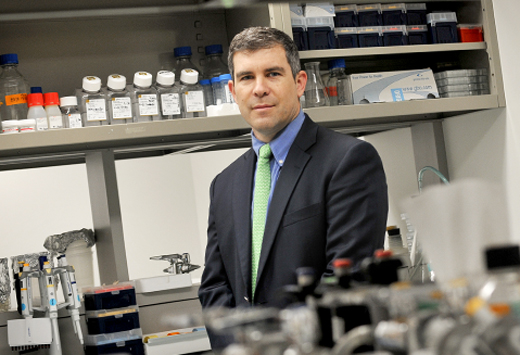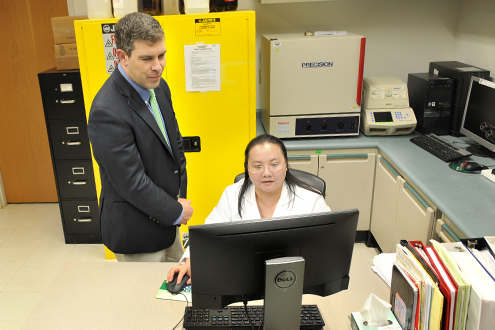The Curious Case of Cartilage

Orthopedist Brett Owens, MD, establishes lab to unravel the mysteries of cartilage, improve joint surgeries
Inside a Brown University Health lab full of beakers, bottles, centrifuges, and refrigeration units, three circular containers -- each small enough to fit in the palm of your hand -- sit on a counter-top platform that shakes them gently, yet incessantly.
What's inside the containers are a sampling of some mysterious and troublesome cells, explain Brett Owens, MD, and researcher Li Yue, PhD. In rare cases, the cells – osteoclasts – will destroy bone where Owens and fellow orthopedic surgeons drill during ACL reconstruction surgery. They can cause such loss of bone that major corrective surgery eventually becomes necessary.
"We are still trying to figure out what makes these cells so active in destroying bone," says Owens, as the cells are prepared to be stained and studied under a microscope.
It's just one of many questions Owens has about finding better ways to perform common, yet challenging joint operations, such as repairing meniscus and anterior cruciate ligament tears in the knees of athletes. Many of Owens' questions relate directly to cartilage -- the thick, rubbery and slippery material needed for joints to function properly.
To help find answers, Owens -- through his practice group, University Orthopedics – has partnered with Brown University Health and Brown University's Warren Alpert Medical School to open a cartilage lab and hire Yue, an expert in cell physiology. It opened in 2016.
His center occupies one section of a lab inside Brown University Health's Coro Building in Providence. Here Owens and Yue are conducting a variety of experiments.
Related StoryDr. Owens performs cartilage transplant to allow young woman to resume running. Read Story |
One is to study how to better preserve cartilage from organ donors. Contrary to what some might think, he says, "Cartilage is alive. It's constantly responding to the pressures being put on it."
Because of that, he says, "a frozen graft will eventually die."
With a shelf life of only about a month – with half of that time needed to test for HIV and other communicable diseases -- extending the shelf life of cartilage can make it more readily available to patients in need of a graft and reduce potentially long waits for a transplant.
Since it's already well understood that cartilage is best preserved at room temperature, Owens and Yue are instead focusing on the medium in which grafts are stored. They are trying different drug cocktails to test their effects on minimizing inflammation and thereby keeping cells in the cartilage alive longer.

Ideally, he says, "we could have grafts on the shelf all of the time. We would have a bank."
Other research involves determining the most efficient ways to use a graft, in other words how much bone and cartilage from a donor is needed for a transplant and how much could be saved for another patient and procedure. These studies using cartilage from cadavers are strictly mechanical and involve assessing how much force "plugs" -- as Owens describes the pieces used to fill lesions -- can withstand before they get dislodged from where they're implanted.
One of the wonderful things about cartilage is that, unlike organ transplantation, they do not spur a significant immune response in recipients so rejection is not an issue, Owens says.
Another exciting research project for Owens involves applying human stem cells to a torn meniscus to promote healing.
"We actually have it healing in a petri dish," he says.
Someday it could prove beneficial in speeding healing following a very common procedure – surgically repairing a torn meniscus. Owens has teamed up with researcher Chat Jayasuriya, PhD, who is affiliated with Rhode Island Hospital and Brown University. Their project has received $75,000 in funding through the Advance Clinical Translational Research initiative, a collaboration between Brown University Health and the state's leading medical and academic centers.
"This is very exciting stuff," Owens says.
This research dovetails nicely with the opening of the Cartilage Repair Center at University Orthopedics. This center offers comprehensive management of cartilage and meniscus injuries using cutting-edge techniques and science.
"We're the only cartilage center in Rhode Island," Owens says.
- Orthopedic Surgeons and Specialists in Rhode Island
- Center for Orthopedic Excellence at Saint Anne's Hospital
- Orthopedics at Morton Hospital
- Cartilage Repair
- Foot and Ankle Care
- Hand and Wrist
- Hip
- Knee
- Shoulder and Elbow
- Spine Care
- Sports Medicine
- Trauma Services
- Orthopedic Oncology
- Rehabilitative Services
-
Research and Clinical Trials
- DORSAL Program
- Research Breaks Through to the Other Side of the Blood Brain Barrier
- Bridge-Enhanced ACL Repair (BEAR)
- Cerebral Palsy: Enhancing Functional Recovery
- Finding Better Ways to Heal ACL Injury
- Predicting Thumb Carpometacarpal Osteoarthritis
- Pursuing the Promise of Smart Joint Implants
- Women's Lacrosse Focus of Bioengineering Researcher
- Patient Stories
- Assess Your Joint Pain
- The Brown University Health Orthopedics Institute in the News
